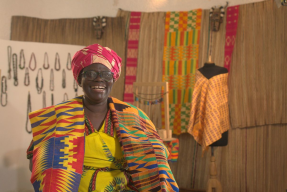Triple Taste of Tabaski: Tour of a Three Day Muslim Holiday
October 29, 2012By: garethleonard
I’m piggybacking Holly’s great blog on Eid al-Adha – i.e. Tabaski – to give you a peek into how another West African country celebrates this highly anticipated holiday. Turns out, as you will learn, the brouhaha differs a bit from place to place.
My introduction to Tabaski began several weeks ago when I arrived for my first day at UIMCEC. Within the first 30 minutes of being seated at my desk, conversation with my supervisor was interrupted twice by clients seeking to take out loans for Tabaski. Both times, my supervisor shot me a look of: “Much more of this to come…”
Even the most destitute of families celebrate this holiday, trying as best they can to save up for months in advance. This year proved particularly financially challenging for families, as the celebrations coincided with the payment of electricity and water bills (both of which, here in Senegal, are collected once every two months) as well as beginning of school year costs. Unfavorable timing of this sort only happens once every +/- 15 years.
Activities began weeks in advance. For women, preparation consisted of getting their hair braided, and carefully crafted outfits ordered (anywhere from one to three outfits, depending on one’s budget). For men, in addition to ordering attire about which they care much less than the women, their energy was poured into purchasing their family’s sheep (prices ranging from $100 to $500,000, again depending on their budget).

Our family’s sheep, purchased three days before Tabaski. All five kids slept outside with him during the nights leading up to the Holiday.

I caved in and let them have their fun. Three sets of hands and eight hours later, voila — braids. Sadly they only stay in for two weeks.
Tabaski’s date each year is dependent upon the lunar calendar. This year, the dates were Friday, October 25 – Sunday, October 27; three full days. The first day kicked off with sheep washing at 6am.
Around 7am, all family members headed to their respective mosque for prayer time. Upon return home somewhere between 30 minutes to one hour later, folks were fast at work, tending diligently to their assigned task. At our home, there was a vegetable chopper, a tea maker, a floor sweeper, etc. My role was “photographer,” a position for which, being a Tabaski neophyte, I suppose I was uniquely suited.
Around 10am, the sheep sacrificing began. Once the animals are “sacrificied” (I’ll spare you of more detail than that…), the eating begins. According to my family, it was an honor to take the first slice of very rare meat. Peppering me with encouragement and pressure – the kids especially — I politely declined. After everything I had seen, it felt it was a bit too much like playing Russian Roulette with my health.
Throughout the day, the kids danced in circles and played all sorts of creative “homemade” games. I was invited to take a turn and participate in one game, which required me to kick an empty water bottle through a makeshift hoop. Off the record, please, my performance was a pitiable 0 for 12.
When the sun began to set, females donned their most elegant dresses and polished faces. The kids skipped around in groups of two to five, visiting as many neighbors and family friend’s homes as they could squeeze into a three hour window. During these visits they asked for small amounts of money. Parents were waiting outside with glowing grins, ready to shake the children’s right hand (the standard Senegalese gesture), extend warm greetings, and fulfill their request for pocket change. It was clear to me that even those who had so little were willing to give so very much.
As for day two and three, see above and put on repeat (less the sheep washing/sacrificing, which only happens once). When 10pm Sunday evening struck, there was finally a return to the zen-like-calm that ordinarily fills the streets of our neighborhood.
The festivities were colorful, lively and extravagant, and the food similarly impressive and memorable. Though I recognize that nodding my head in response to my host family’s suggestion that “I must return to Senegal every year for Tabaski!” will most likely be unattainable, I do sincerely hope it’s not my last.
Anna Forsberg (KF19) is a Kiva Fellow, working with UIMCEC in Dakar, Senegal.
PREVIOUS ARTICLE
Expanding Access to Higher Education in Kenya →NEXT ARTICLE
#KivaTrip: Exploring Kiva's new connections in India →


















